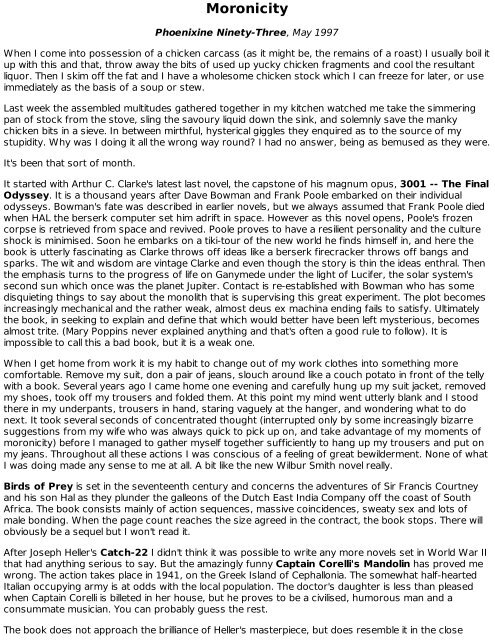Triffids Beard 2 - The Bearded Triffid
Triffids Beard 2 - The Bearded Triffid
Triffids Beard 2 - The Bearded Triffid
You also want an ePaper? Increase the reach of your titles
YUMPU automatically turns print PDFs into web optimized ePapers that Google loves.
Moronicity<br />
Phoenixine Ninety-Three, May 1997<br />
When I come into possession of a chicken carcass (as it might be, the remains of a roast) I usually boil it<br />
up with this and that, throw away the bits of used up yucky chicken fragments and cool the resultant<br />
liquor. <strong>The</strong>n I skim off the fat and I have a wholesome chicken stock which I can freeze for later, or use<br />
immediately as the basis of a soup or stew.<br />
Last week the assembled multitudes gathered together in my kitchen watched me take the simmering<br />
pan of stock from the stove, sling the savoury liquid down the sink, and solemnly save the manky<br />
chicken bits in a sieve. In between mirthful, hysterical giggles they enquired as to the source of my<br />
stupidity. Why was I doing it all the wrong way round? I had no answer, being as bemused as they were.<br />
It's been that sort of month.<br />
It started with Arthur C. Clarke's latest last novel, the capstone of his magnum opus, 3001 -- <strong>The</strong> Final<br />
Odyssey. It is a thousand years after Dave Bowman and Frank Poole embarked on their individual<br />
odysseys. Bowman's fate was described in earlier novels, but we always assumed that Frank Poole died<br />
when HAL the berserk computer set him adrift in space. However as this novel opens, Poole's frozen<br />
corpse is retrieved from space and revived. Poole proves to have a resilient personality and the culture<br />
shock is minimised. Soon he embarks on a tiki-tour of the new world he finds himself in, and here the<br />
book is utterly fascinating as Clarke throws off ideas like a berserk firecracker throws off bangs and<br />
sparks. <strong>The</strong> wit and wisdom are vintage Clarke and even though the story is thin the ideas enthral. <strong>The</strong>n<br />
the emphasis turns to the progress of life on Ganymede under the light of Lucifer, the solar system's<br />
second sun which once was the planet Jupiter. Contact is re-established with Bowman who has some<br />
disquieting things to say about the monolith that is supervising this great experiment. <strong>The</strong> plot becomes<br />
increasingly mechanical and the rather weak, almost deus ex machina ending fails to satisfy. Ultimately<br />
the book, in seeking to explain and define that which would better have been left mysterious, becomes<br />
almost trite. (Mary Poppins never explained anything and that's often a good rule to follow). It is<br />
impossible to call this a bad book, but it is a weak one.<br />
When I get home from work it is my habit to change out of my work clothes into something more<br />
comfortable. Remove my suit, don a pair of jeans, slouch around like a couch potato in front of the telly<br />
with a book. Several years ago I came home one evening and carefully hung up my suit jacket, removed<br />
my shoes, took off my trousers and folded them. At this point my mind went utterly blank and I stood<br />
there in my underpants, trousers in hand, staring vaguely at the hanger, and wondering what to do<br />
next. It took several seconds of concentrated thought (interrupted only by some increasingly bizarre<br />
suggestions from my wife who was always quick to pick up on, and take advantage of my moments of<br />
moronicity) before I managed to gather myself together sufficiently to hang up my trousers and put on<br />
my jeans. Throughout all these actions I was conscious of a feeling of great bewilderment. None of what<br />
I was doing made any sense to me at all. A bit like the new Wilbur Smith novel really.<br />
Birds of Prey is set in the seventeenth century and concerns the adventures of Sir Francis Courtney<br />
and his son Hal as they plunder the galleons of the Dutch East India Company off the coast of South<br />
Africa. <strong>The</strong> book consists mainly of action sequences, massive coincidences, sweaty sex and lots of<br />
male bonding. When the page count reaches the size agreed in the contract, the book stops. <strong>The</strong>re will<br />
obviously be a sequel but I won't read it.<br />
After Joseph Heller's Catch-22 I didn't think it was possible to write any more novels set in World War II<br />
that had anything serious to say. But the amazingly funny Captain Corelli's Mandolin has proved me<br />
wrong. <strong>The</strong> action takes place in 1941, on the Greek Island of Cephallonia. <strong>The</strong> somewhat half-hearted<br />
Italian occupying army is at odds with the local population. <strong>The</strong> doctor's daughter is less than pleased<br />
when Captain Corelli is billeted in her house, but he proves to be a civilised, humorous man and a<br />
consummate musician. You can probably guess the rest.<br />
<strong>The</strong> book does not approach the brilliance of Heller's masterpiece, but does resemble it in the close


